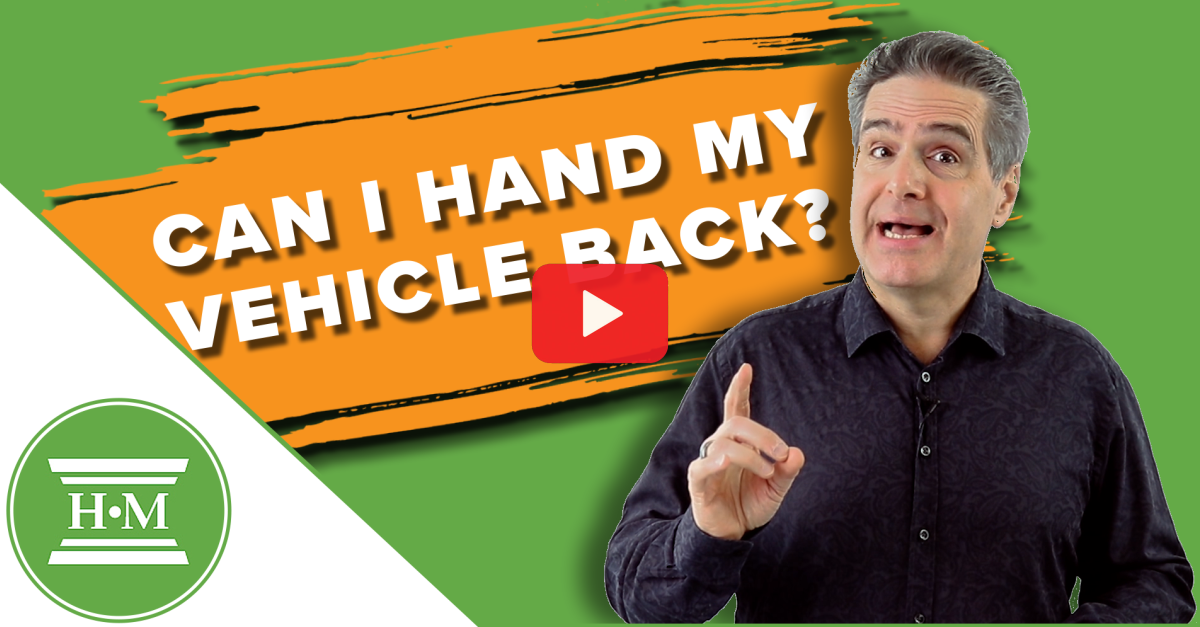
Cars – coupes, sedans, sport utility vehicles, trucks. Roughly two-thirds of the people who file insolvency with us own a vehicle. The vast majority want to keep their car when they file a consumer proposal or bankruptcy, but there are times when it makes more sense to give it back.
It may be that you can’t afford the payments. Or maybe you’ve discovered that you owe two or three times what the car is actually worth. Maybe it’s a lemon – you just can’t stand it anymore. There are lots of reasons why people decide to voluntarily give their vehicle back to a finance company when they file for insolvency. Here is how a voluntary surrender works and what happens to the debt.
Table of Contents
What is a Voluntary Repossession?

If you have a secured car loan or lease, the lender (or finance company) has the right to repossess your vehicle if you fall behind on your payments.
What people don’t know is that you don’t have to wait for the creditor to repo the vehicle. You can voluntarily surrender the vehicle to your lender or dealership on your own.
To make a voluntary repossession, you notify your lender you will no longer make payments and wish to return the car. Your lender may ask you to drop the vehicle off at an agreed time and place, or they may send someone to repossess the vehicle from you.
After repossession, the lender will sell the vehicle and send you a statement of realization. Included in this statement will be a calculation of how much you still owe (called the deficiency or shortfall). This number represents the difference between how much loan was remaining on the vehicle and how much the car was sold for. Your lender will also add various fees, penalties, and repossession costs.
The deficiency becomes an unsecured debt that you are responsible for paying. The lender can sue you to collect, obtain a judgment in Court and pursue legal options like a wage garnishment. They may also send the account to a collection agency.
Dealing with the Loan Shortfall
If you are filing a consumer proposal or bankruptcy to deal with your other debts like credit card debt, payday loans or tax debts, you can include the shortfall or deficiency on the loan balance in your filing. Since insolvency eliminates unsecured debt, this debt will be eliminated like any other.
It is important to understand that for your car loan debt to be discharged in a bankruptcy or consumer proposal, you must surrender the vehicle either before or as part of the filing. You cannot decide to return the vehicle weeks or months after you file. If you do, you will remain liable to pay any balance owed.
If you feel you have purchased or leased a vehicle that is more expensive than you can afford, it is critical that you talk with a Licensed Insolvency Trustee about your intentions prior to signing your paperwork.
When Should You Walk Away From an Auto Loan or Lease?
There are three main reasons to hand back a car to your lender:
- You are no longer able to make your car loan payments
- Your car loan is in collection for missed payments, and you may be at risk of repossession anyway
- Your car is worth less than the amount you owe on the loan (this is known as negative equity)
Car loan payments shouldn’t cause you further financial problems. If you purchased or leased a vehicle that is too expensive or the interest rate is too high and you are no longer able to make your payments, you need to consider your options.
Steps to Take Before Surrendering Your Vehicle
Before deciding to hand back your vehicle, explore these options with your lender:
- Contact your lender immediately to discuss your situation
- Ask about refinancing for a lower interest rate
- Consider extending your loan term to lower monthly payments
However, be cautious about extending your loan. Long-term loans mean you pay off the principal very slowly and can easily end up owing more than the car is worth. In a five-year car loan, for the first 3 years, you usually owe more than the car is worth. In six and seven-year car loans, the problem is worse – it can take four or even five years to get the balance of the loan below the vehicle’s value.
If refinancing isn’t possible or won’t solve your long-term affordability issues, voluntary surrender might be your best option. A better choice may be to hand back this car and purchase another, lower-cost vehicle. Because of the damage to your credit score from any repossession, it may be more difficult to finance another vehicle purchase except at a very high interest rate. You will need to do the math on how much you can save in terms of monthly payments by downsizing your car.
How to Surrender Your Vehicle to the Finance Company
- Contact your lender to explain your situation
- Request voluntary surrender procedures in writing
- Remove all personal belongings from the vehicle
- Document the vehicle’s condition with photos
- Arrange a convenient drop-off time and location
- Get written confirmation of the surrender
We also advise clients to voluntarily return the vehicle and arrange for a replacement prior to filing bankruptcy. This ensures that you only have one mark on your credit report, not two.
Again, most people who file a bankruptcy or consumer proposal keep their vehicle. Getting rid of other debts can free up enough cash flow so your car loan payment is affordable. But if your loan or lease payment is eating up more of your budget than it should, talk to your trustee about options to return the vehicle and discharge your obligation under the loan or lease.
Frequently Asked Questions
If I surrender my car, do I still owe money? Yes, you will still owe the difference between your loan balance and what the lender gets from selling the vehicle, plus any fees. However, this deficiency balance can be included in a consumer proposal or bankruptcy if you’re considering those options.
Can I get another car loan after voluntary surrender? Yes, but expect higher interest rates and stricter terms for 2-3 years after the surrender. Working with specialized lenders and making a larger down payment can improve your chances of approval.
How badly will surrendering my car hurt my credit? A voluntary surrender will lower your credit score temporarily, and the negative information will stay on your credit report for 7 years. However, the impact is no different than continued missed payments on your car loan. Surrendering the vehicle can stop the clock and begin the seven-year period for removal.





